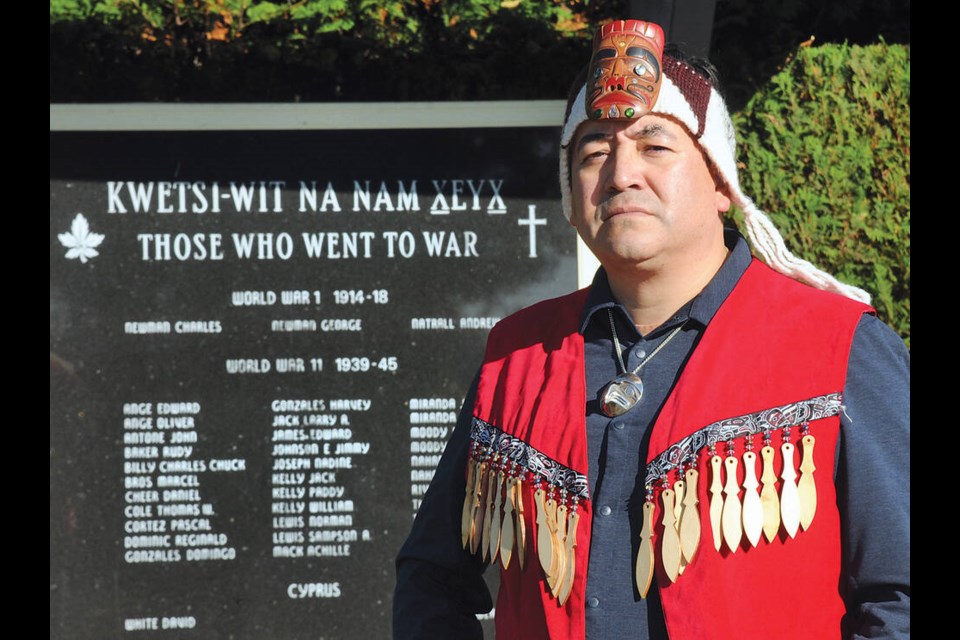In the lead up to Remembrance Day on Saturday, Nov. 11, much of the country will be taking moments to pause and remember the work of the armed forces members who died in the line of duty. Among them were sacrifices made by First Nations, Métis and Inuit soldiers.
Sacrifices, says Sḵwx̱wú7mesh Úxwumixw (Squamish Nation) elected council member Sxwíxwtn (Wilson Williams), we would do well to remember.
Last month, Williams returned from a trip to the Netherlands where he had been representing the Squamish Nation as part of Veteran Affairs Canada’s Indigenous Legacy Project.
The initiative identifies and marks the graves of Indigenous soldiers who fought for the liberation of the Netherlands – one of Canada’s major contributions during the Second World War.
“It’s a research- and remembrance-based initiative, to recognize, honour and educate on the Indigenous soldiers who sacrificed their lives,” said Williams, adding how, of all the “million-plus Canadians” who served in the Second World War, 3,000 of those were identified as Indigenous soldiers.
Williams visited four cemeteries, one being the Holten Canadian War Cemetery where 17 Indigenous graves have so far been identified. Among those 17 lay Pte. Daniel Cheer, a Squamish Nation member and Williams’ distant relative.
“I think the project has done this in a good way, reconnecting soldiers with their families. Now we know Daniel Cheer was one of 30 Squamish Nation members who volunteered to serve overseas in the war, we know all his stories and all about who he was,” said Williams.
A commemoration ceremony began at daybreak. A “sacred circle” where he and family members of the other Indigenous soldiers introduced themselves and shared the history of the serviceman they were connected to. It was a moving moment for all involved, he said, one made especially so when time came for him to share his own words.
“I was one of the last two to speak and, by this time, it was brisk with only a slight drizzle. Just after I introduced myself the rain picked up like a storm,” he said.
“Through our culture and teachings, when the weather changes dramatically or drastically, it’s telling us something. Mother Nature, the creator, was telling us that we were meant to be there. We were meant to be there to support each other, but not only that, visit our loved ones.”
Prior to the creation of the Indigenous Legacy Project, no one had been to visit Cheer since he perished in action in 1945, said Williams. It was a similar story for many of the Indigenous soldiers buried there.
As the family members laid down their offerings of flowers and tobacco upon the graves, Williams, wearing his Nation’s regalia and with drum in hand, took a quiet moment at Cheer’s final resting place.
“I spent quite some time with our loved one there. I laid our Squamish Nation flag down over his grave site, and laid the offerings. I shared a song with him, and spoke prayer in our language. I spoke of connectivity, and being reunited, and said how his family in our community are thinking of him.”
Williams said there is still “a long road to go” in terms of ensuring Indigenous soldiers are given the same recognition and respect as their comrades, but projects like Canada’s Indigenous Legacy Project are vital to bridging that gap.
Education could be improved, he said, by having curriculum in schools include more engagement with Indigenous communities. He envisions a future where students can take part in an exchange program and spend a week or two in a country more connected with the Second World War.
“War was never in our backyard. You go to Europe, and war is everywhere. Here we undermine the value and the commitment and the heart and the soul that went into going overseas,” he said.
“We need to do more. We need to travel. We need to see what resources are out there from Veteran Affairs Canada, and bring these stories alive.”
We should also, points out Williams, be giving just as much consideration to the wounded, injured and sick servicemen who made it home.
Following his time in the Netherlands in September, the Squamish Nation councillor visited Germany’s Dusseldorf for the closing ceremony of this year’s Invictus Games. Representing the Four Host First Nations, he gifted a ceremonial paddle to Team Germany and received the flag alongside Team Canada, taking the torch, as it were, and setting things in motion for the 12-day Invictus Games set to take place in Vancouver and Whistler in 2025.
During an event at the Canada House a few days later, a visiting Prince Harry, founder of the games, asked Williams to make a speech. He would be the best person, the monarch explained, to touch on the importance of remembering those who had lost their lives in the line of duty.
“I was quite overwhelmed, because I really wanted to do it right and in a good way, and really empower the heart of why we were all there,” said Williams.
“I wanted to talk about how symbolic and uniting it is, those Games. But not only that, how much healing can be found in recognizing the soldiers that made it back, and recognizing the soldiers who didn’t.”
Everybody is affected by war in one way or another, said Williams, and so all can be a voice and an ambassador, a witness to pay respects and “hold everybody up.”
Mina Kerr-Lazenby is the North Shore News’ Indigenous and civic affairs reporter. This reporting beat is made possible by the Local Journalism Initiative.



